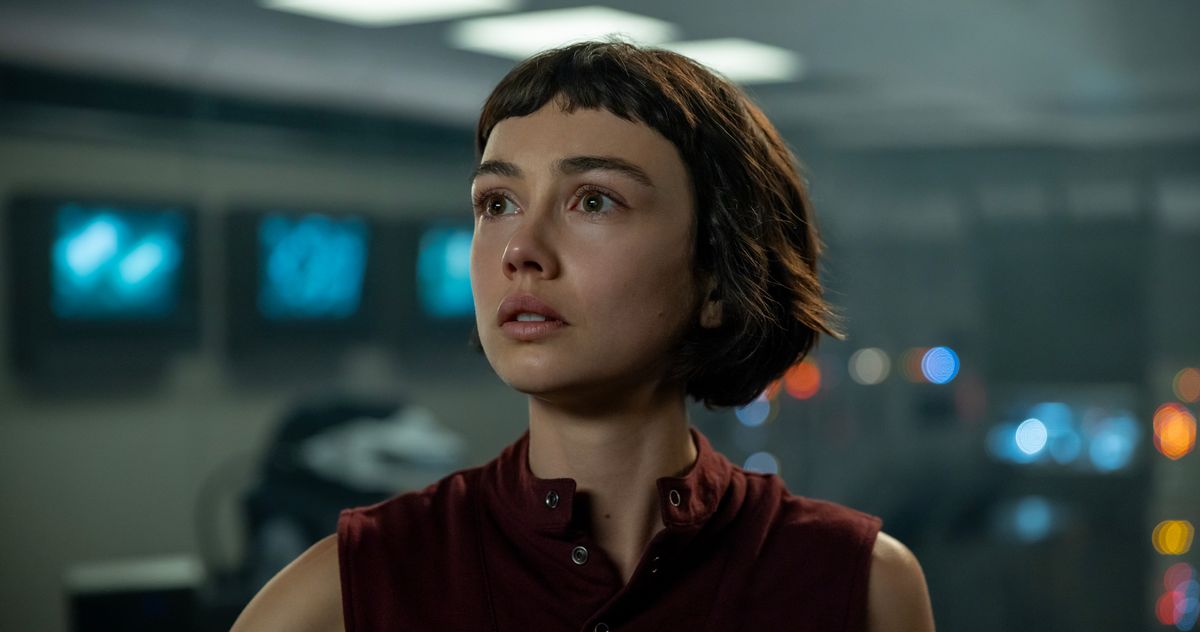
Neverland
Season 1
Episode 1
Editor’s Rating
5 stars
*****
The strong core of this series premiere — and likely the heart of the whole series — is in the saga of Wendy (Sydney Chandler).
Photo: Patrick Brown/FX
Which Alien is the true Alien? It has to be the first movie, right? You’ve got the snappy Dan O’Bannon script, the atmospheric Ridley Scott direction, and the killer cast putting across a simple plot in which a ravenous, seemingly unkillable monster stalks a spaceship crew. If you’re navigating your way through any new Alien story, the 1979 original has to be your lodestar, right?
But wait! What about Aliens? That massive 1986 box-office hit, written and directed by James Cameron, turned the haunted house horror of the first film into a masterpiece of militaristic Reagan-era blockbuster filmmaking. If you want your Alien project to have mass appeal, you must follow in Cameron’s heavy bootprints, right?
I could go on. There are cases to be made — weaker cases, but cases nonetheless — for director David Fincher’s icy and cerebral Alien3, or for Scott’s more philosophical 2010s Alien prequels Prometheus and Covenant, or even for the trashy thrills of Alien vs. Predator. (Whither Resurrection and Romulus? Let’s just say that I have seen them and leave it at that.) The point is: Alien has been a surprisingly flexible franchise across the decades, allowing its stewards to blend genres and explore big ideas while still terrifying audiences with toothy beasties.
Writer-producer Noah Hawley’s new Alien: Earth quickly finds its own lane, with an opening episode that is one of the best chapter ones of a TV series that I’ve seen in a good long while. With “Neverland,” Hawley nods to his predecessors, drawing freely from the deep-space monster-attack concept of Alien, the war-movie elements of Aliens, and the free-floating anti-corporate/anti-tech paranoia that has been a part of nearly every entry in this series (including its many novels, comics, and games). As he has shown repeatedly with his Emmy-winning FX series Fargo, Hawley is a pastiche artist who can work within almost any storytelling mode, while still adding his personal touch. With Alien: Earth, Hawley takes the basic framework of an Alien story and fills it with his own kooky takes on Peter Pan, Pinocchio, and Willy Wonka.
Alien: Earth declares its Alien-ness right from the start, with an opening that plays like a condensed version of the 1979 movie. In deep space, 805 million miles from Earth, in the year 2120, a motley crew of exhausted contractors is nearing the end of a 65-year mission for the Weyland-Yutani corporation, on a ship that contains dangerous cargo. Unlike in Alien, these astronauts know what they’re carrying: a menagerie of killer creatures, collected from various planets and bound for the company’s research scientists back home. Nevertheless, the crew still suffers a terrible fate when a specimen gets loose and starts tearing them apart.
The ship, the USCSS Maginot, resembles the Nostromo from Alien. It has the same kind of cryogenic sleep pods; the same kind of crew members in T-shirts and underpants; and the same mix of humans, androids, and cyborgs. (There’s even a pet cat!) Early on, Hawley teases us with the idea that he might just do Alien redux. He introduces a Ripley-esque badass, played by Karen Aldridge (one of Hawley’s Fargo stars), and he throws in an untrustworthy cyborg, Morrow (Babou Ceesay), similar to Alien’s Ash. But then the woman gets killed by an unleashed Xenomorph — the familiar long-tailed, big-headed, multi-mouthed monster from every Alien movie — leaving Morrow to manage the chaos.
These Maginot scenes are mostly plot drivers. The strong core of this series premiere — and likely the heart of the whole series — is in the saga of Wendy. Sydney Chandler makes a powerful first impression as the first true human-robot hybrid, the product of a groundbreaking experiment to place the consciousness of a real human child inside a synthetic body. Her creators at the Prodigy Corporation — led by their genius boss, Boy Kavalier (Samuel Blenkin) — have determined that this new hybrid technology will only work with young minds. So they’ve rounded up a batch of terminally ill kids and offered them the chance to live on inside super-strong adult bodies. Wendy (formerly known as Marcy) is the test case, and once she proves the procedure works, Prodigy surrounds her with an army of hybrids, in training to be superhuman mercenaries.
The project’s chief day-to-day supervisor is Kirsh (Timothy Olyphant), a “synthetic” — a full-on humanoid robot with artificial intelligence — who has some fascinating philosophical differences with his colleague Dame Silvia (Essie Davis). While Silvia wants to smooth over Wendy’s abrupt transition from childhood to adulthood via hormones that simulate adolescence, Kirsh fails to see the point of introducing human imperfections into fine-tuned machinery. As for Kavalier — their colorfully attired, puckish, Peter Pan–loving overlord — he mainly seems to want Wendy to be just human enough to become a mentor to the other sickly kids he’s turning into “Lost Boys.”
The other major character introduced in the series premiere is Wendy’s brother, Joe DiMaggio Hermit (Alex Lawther), a paramilitary medic working for Prodigy’s private-security force. The man everyone calls just “Hermit” is a man out of time, devoted to baseball and the Ice Age movie franchise, which he remembers watching with his sister as a lad. The scenes depicting Hermit’s and Wendy’s memories resemble David Lynch’s dreaminess, with a haze that makes flashbacks feel more like fantasies. The retro pop-culture references only add to the surreality, as does Hawley’s love of superimposing one image over another.
The story lines in “Neverland” converge when the Maginot crashes in Prodigy City in New Siam. While Hermit’s soldiers rush in to contain the situation, from afar the Prodigy hybrids consider making their public debut, planning to travel to New Siam to prove to the world their value — both practical and financial.
Just as the Alien: Earth premiere begins with a knowing riff on Alien, so it ends with an equally knowing riff on Aliens, as multiple squads of skilled warriors — working on behalf of Earth’s corporate overlords — attempt to survive and subdue a panoply of escaped predators. The final 20 minutes of this episode consists of almost nonstop action-horror, as multiple humans wander through the dark wreckage in and around the Maginot, before getting attacked by various squirmy bloodletters.
This all works smashingly well just on the level of pure genre thrills. Hawley, who directed the premiere, brings an impressive sense of scale to the action, conveying the hugeness of the spaceship and its urban crash zone, contrasted with the smallness of the figures trying to make their way through the mayhem. There’s a bit of mystery introduced in these scenes as well, as the Maginot’s lone non-alien survivor, Morrow, brushes off his would-be rescuers. Coupled with Morrow’s indifference to the slaughter of his crewmates, his willingness to let Prodigy’s soldiers stumble into danger is suspicious. Is he just loyal to Weyland-Yutani, or is something else going on?
Alien in all its forms has always been at some level about big things, be they monsters or institutions, trying to consume and/or subjugate small things. It’s telling that, from his perch at his Neverland Island home base, Kavalier sees a Weyland-Yutani ship crash into a city he runs and gives his soldiers two orders: to triage the survivors by income bracket, and to seize whatever’s on that vessel.
The episode ends as the Lost Boys are closing in on Prodigy City, with Wendy showing a remarkable level of human emotion as she prepares to lead her troops, save lives, and potentially reunite with her brother. Even when Kirsh tries to harsh her vibe with a speech about humanity’s dreary historical progression — from us being food for predators to us mistakenly believing we’re the predators — she keeps insisting she’s “special” enough to make a difference. After all, she’s not fully human, machine, or alien. She’s all of that and more. She’s something else.
• The series begins with an opening crawl explaining how technology has affected human society in the 2100s. The world is run by corporations, all apparently in a cold war with one another. We don’t get a full breakdown of the state of things, but we do learn that Weyland-Yutani controls the Americas, plus Mars and Saturn, while a company called Dynamic runs Earth’s moon. As for Prodigy, we know it owns at least one city in New Siam (likely in Southeast Asia, given the name); but Boy Kavalier’s real source of power is his control over AI and the synth technology. Longtime Alien franchise fans know that a big reason for Weyland-Yutani’s deep-space missions is to discover new things to exploit. What Kavalier has in mind with his Prodigy City “rescue” is straight-up corporate theft, so he can make use of whatever the Maginot found.
• The outstanding Alien: Earth score — by turns rousing and creepy — is by the Emmy-winning Jeff Russo, who has worked with Hawley on Legion and Fargo. This episode also has a couple of excellent needle drops: TV on the Radio’s “Killer Crane” and Black Sabbath’s “The Mob Rules.”
• I look forward to seeing how Hawley & Co. handle the idea that Wendy and the Lost Boys are essentially grade-schoolers thrust into adulthood. So far it’s adding a quirky energy to the performances — especially from Chandler, who plays Wendy as both playfully curious and more than a little anxious. One minute she’s talking about how it’s weird to have breasts (“They move around when I run”) and the next she’s gathering all of her stuffed animals so she can tell them about her brother.
VULTURE NEWSLETTER
Keep up with all the drama of your favorite shows!
Vox Media, LLC Terms and Privacy Notice
Related

